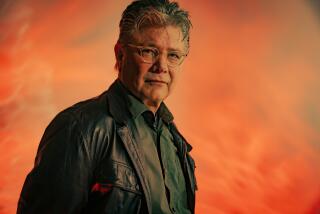Times critics on Anthony Minghella’s movies
- Share via
Times film critics on a few of Anthony Minghella’s most memorable movies:
“The English Patient”
(Nov. 15, 1996)
“Love in the extremes of wartime. Love in a dangerous, unstable universe where questions of nationality and betrayal predominate. Love that sears and scars, like the pitiless expanses of the Sahara. Love that heals, like the verdant countryside of Italy. ‘The English Patient’ explores it all, surely, grandly, operatically.
“A mesmerizing romantic epic taken from Michael Ondaatje’s Booker Prize-winning novel, ‘The English Patient’ stars Ralph Fiennes, Juliette Binoche and a radiant Kristin Scott Thomas in a story that spans two continents and a single world war. ‘The heart is an organ of fire’ is its theorem, and it’s proved with absolute assurance. Created by writer-director Anthony Minghella, the film echoes the Ondaatje book by being poetic at the core.”
--
Kenneth Turan
“The Talented Mr. Ripley”
(Dec. 24, 1999)
“ ‘The Talented Mr. Ripley’ is a wonderfully accomplished work that’s unconvincing at its core. A lack of nerve, or perhaps a difference in temperament between filmmaker and author, has resulted in a beautifully mounted and directed film that, despite the presence of Matt Damon and Gwyneth Paltrow, is unexpectedly lacking in emotional impact. Presented with one of the most unnerving, breathtakingly amoral characters in modern literature, writer-director Anthony Minghella worried that the audience would resist committing themselves to such a chilling protagonist. So he monkeyed with the delicate balance of forces and personalities that make the novel memorable, a move that ended up backfiring and making Tom Ripley less interesting rather than more.”
--
K.T.
“Cold Mountain”
(Dec. 24, 2003)
“The Civil War epic ‘Cold Mountain’ opens with a stunning vision of hell. It’s 1864, Petersburg, Virginia, and Union soldiers have tunneled into the ground to lay explosives beneath Confederate lines. When the charges ignite, it’s as if the very Earth were shattering -- men are blown skyward then fall straight into their graves, buried dead and alive under dirt.
“Director Anthony Minghella takes us so close to the mud, the blood and the delirium of this nightmare that while watching the movie I involuntarily raised one of my hands as if to ward off its impact. The palpability of the violence, its uncomfortable closeness -- there’s no place on screen, no pocket of calm, you can escape to -- is fundamentally different from the violence in much contemporary film. Modern cinema has made us comfortable with movie death, mostly by turning violence into a sanitized package of fun. In this sequence and for stretches in Minghella’s adaptation of Charles Frazier’s acclaimed novel, the director allows you to feel the heaviness of death, letting it cast a pall over the story.”
--
Manohla Dargis
More to Read
The biggest entertainment stories
Get our big stories about Hollywood, film, television, music, arts, culture and more right in your inbox as soon as they publish.
You may occasionally receive promotional content from the Los Angeles Times.










